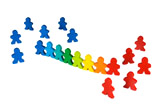 |
|||
| OVERVIEW | |||
| WHITE PAPER | |||
|
Introduction Consultations Our questions Your views |
|||
| GOOD PRACTICES | |||
|
|||
| PARTNERS | |||
| DOCUMENTS | |||
| CONTACT US | |||
|
The concept of intercultural dialogue Objectives and conditions
Our cultural environment is changing quickly and becoming more and more diversified. Cultural diversity is an essential condition of human society, brought about by cross-border migration, the claim of national and other minorities to a distinct cultural identity, the cultural effects of globalisation, the growing interdependence between all world regions and the advances of information and communication media. More and more individuals are living in a “multicultural” normality and have to manage their own multiple cultural affiliations. Cultural diversity is also an economic, social and political plus, which needs to be developed and adequately managed. On the other hand, increasing cultural diversity brings about new social and political challenges. Cultural diversity often triggers fear and rejection. Stereotyping, racism, xenophobia, intolerance, discrimination and violence can threaten peace and the very essence of local and national communities. Dialogue between cultures, the oldest and most fundamental mode of democratic conversation, is an antidote to rejection and violence. Its objective is to enable us to live together peacefully and constructively in a multicultural world and to develop a sense of community and belonging. In political parlance, the term “intercultural dialogue” is still only loosely defined. In a general sense, the objective of intercultural dialogue is to learn to live together peacefully and constructively in a multicultural world and to develop a sense of community and belonging. Intercultural dialogue can also be a tool for the prevention and resolution of conflicts by enhancing the respect for human rights, democracy and the rule of law. More specifically, the following goals have been outlined:
Easier than a definition is a description of the conditions, the “enabling factors” that characterize a true, meaningful intercultural dialogue. Based on existing experience, one can propose at least six crucial conditions that must be fulfilled from the very outset, or achieved during the process:
In the past, the Council of Europe has rarely offered suggestions for a definition of intercultural dialogue (the most notable exception is the “Opatija Declaration” of 2003).
In this definition, “open and respectful” means “based on the equal value of the partners”; “exchange of views” stands for every type of interaction that reveals cultural characteristics; “groups” stands for every type of collective that can act through its representatives (family, community, associations, peoples); “culture” includes everything relating to ways of life, customs, beliefs and other things that have been passed on to us for generations, as well as the various forms of artistic creation; “world perception” stands for values and ways of thinking.
|
 Print
Print  Send
Send  Franšais
Franšais 